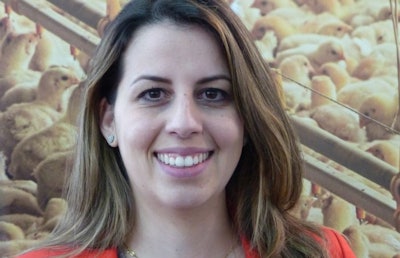
The International Poultry Council is in search of a new secretary general, as Marília Rangel Campos will exit that post to take a new role with an animal health company in Brazil.
IPC will accept applicants for the position until September 25. The IPC Executive Committee has set up a hiring committee to oversee the process of finding a new secretary general.
Campos has held the secretary general’s role for the past four years, and she is the first person to do the job on a full-time basis. She was hired to succeed George Watts, who retired.
Campos, a resident of Brazil who came to the IPC after serving as foreign markets coordinator with the Brazilian Association of Animal Protein (ABPA), had a productive four years with IPC, although she is quick to credit the organization as a whole for its accomplishments.
“It has always been a teamwork. I could never have done it all alone,” she said.
Membership growth
During her time with IPC, the membership base grew from 35 associate members to 56 and from 24 country members to 29. Among associate members, IPC previously had only four poultry producers/processors, and now there are 14. The participation of members in IPC conferences grew from an average 75 to an average of 90 in the last two years.
Creation of IPC working groups
Also during the past four years, four working groups were created to increase the participation of members in the discussions and to enable the production of position statements for the poultry meat sector. The working groups started with only 5-10 participants and we now have meetings with more than 30 people.
These working groups produced papers that had a positive impact in the poultry meat sector positioning of important issues, such as antimicrobial resistance and sustainable development, Campos said. The IPC was the first animal protein organization to put out a position statement on the responsible use of antimicrobials, taking the lead in the discussion of a topic of direct impact on our veterinary practices. Now, the group is working on a guide to responsible use of antimicrobials which will be published with an international organization.
Regarding sustainable development, the IPC working group defined what sustainability is for the poultry meat sector and linked these pillars to the UN’s Sustainable Development Goals (SDGs), specifying actions that both IPC and its members can undertake to achieve the Goals. A historic achievement was the joint signature of a Declaration of Commitment to the SDGs by the IPC and Food and Agriculture Organization of the United Nations (FAO) during the Sao Paulo conference.
IPC working groups are also working on position statements on animal welfare and food safety, which will help leverage the understanding and role of the poultry meat sector to those issues.
With the OIE, IPC has been very active in the comments of proposed amendments to the Terrestrial Code, more specifically those related to animal welfare and avian influenza infections. IPC was the only private sector organization that commented on Code Commission report that brought changes to the avian influenza chapter. And it has been consulted by the OIE a few times for expert designation, inputs and general comments.
In the international trade arena, the IPC was fundamental to question regulations that prohibited the use of waterbath stunning for poultry in the Gulf countries. Because of IPC’s interventions (together with key country members, like the U.S., Brazil, Denmark and France, a thorough revision of the use of the technology was conducted by authorities from the UAE, which led to a historic change in the regulations of that country. The fight, however, is not over, Campos said, as the IPC needs to continue to address this issue at the Gulf Standardization Organization level, to make it valid in the entire Gulf.
Campos said she will continue to support the IPC through the transition period.

















